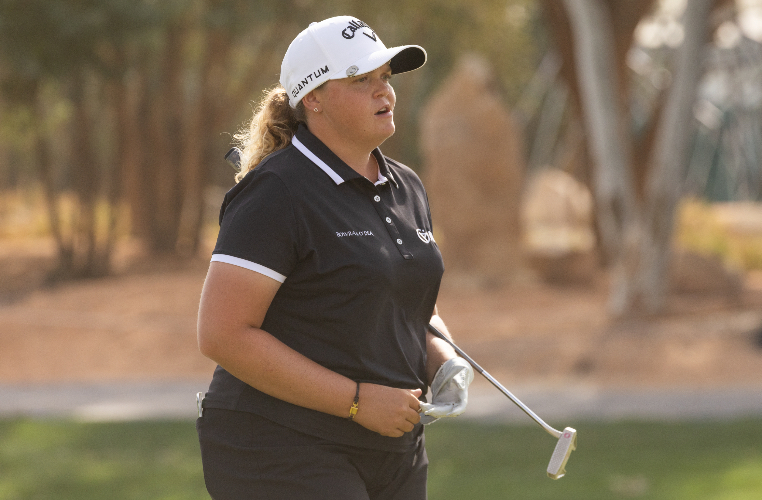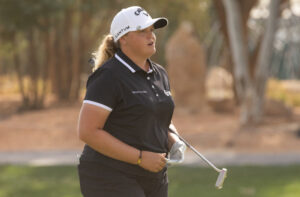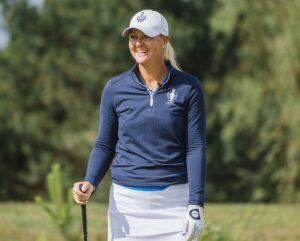Foreword from Roberta Bowman, LPGA’s Chief Brand and Communications Officer:
When we introduced Drive On in 2019, we wanted to celebrate the attributes of strength, focus and perseverance that have built the LPGA over 70 years. We also wanted to share the stories of our people – the role models whose courage and accomplishments inspire us – on and off the golf course.
Madelene Sagstrom is all of those things and more. Madelene’s Drive On story is hard to read and important to hear. One in nine girls under age 18 is sexually abused at the hands of an adult. Madelene’s is a very personal story of violation, introspection, allyship, strength and triumph. She shares it here in the spirit of helping others:
None of Us are Alone:
Madelene Sagstrom’s Drive On Story
I’m sitting in a hotel room in Greenwood, South Carolina. And I can’t stop crying.
It’s March 2016 and I’m here to prepare for a Symetra Tour event later in the season.
I want to give myself the best chance to succeed. But I can’t keep this inside of me anymore. I need to tell someone about the secret that I’ve kept bottled up inside of me for 16 years…

“When I was seven years old, something terrible happened to me.”
Growing up in Sweden, I was so naïve. I thought I could trust everybody. I thought everybody was supposed to be my friend. I hung around a lot with my brother when we were kids and many of our close friends were older people who lived near us in the countryside about an hour from Stockholm.
One day, I was by myself going over to see my friend, a man I was really close to but who was not a relative.
I went inside. We hung out. And he sexually abused me.
I was 7 years old.
Afterward, I went home. And for 16 years, I acted like nothing ever happened.
For years, I immersed myself in golf. Golf became my savior; I could lose myself in the game. And when I played well, I was okay.
That became a pattern. If I could just play a little better, I thought I’d be happier. Then I carried it a step further. If I could just be a little skinnier, a little nicer, a little more likable…
What I didn’t realize is that I simply did not like who I was. I felt insecure – never thinking that I was worthy enough or good enough. I didn’t like who I saw in the mirror. I couldn’t even put body lotion on my legs because of how much I hated my body, hated myself, all because of what someone else did to me.
I never wanted to acknowledge the assault, to myself or anyone else. Even after I became an adult and could understand that what happened to me was not my fault – that the feelings I had about myself were rooted in the trauma from long ago – it didn’t help. Somehow, I thought I’d be okay not talking about it.
But I was wrong.

I had a big awakening in 2016 when I joined the Symetra Tour. Robert Karlsson, a Ryder Cup player who I met through the Swedish National team was my mentor back then. At the time, I was struggling with my emotions on the course. He really pushed me to dig deeper and understand the reasons why I reacted the way I did. I had this thing come up in my mind. At first I didn’t think it was important. But it kept coming back again and again. I thought, ‘Maybe there is something there. Maybe I should tell Robert.’
One day, in that hotel room in Greenwood, South Carolina, I told him that I had been sexually abused as a child. As he looked at me, with a mixture of shock and empathy on his face, my entire world broke down. I wept uncontrollably. Sixteen years of secrets poured out with each tear and every heaving gasp.
I had no idea how being sexually abused by a man I trusted affected me. All those years, I blamed myself. I hated myself. I despised my body and hurt myself both mentally and physically. That day haunted me. I had nightmares about it and did everything I could to escape.
“Telling Robert . . made me feel free”
Telling Robert was the biggest release I’ve ever had. It made me feel free. It’s a big reason why I won three times in 2016 and earned my LPGA Tour card. I didn’t feel like I was hiding anymore. I felt like I could do whatever I wanted. I felt like I would be okay.
Robert understood the pain that I’d been carrying for so many years. On the golf course, we experienced so many of the same thoughts. He knew where I was coming from as a player, so I felt really free to speak to him. He was my ally. He was someone I could trust 100% and provide the counsel and support I needed.
Together, we decided that I needed to tell my parents. That was one of the worst days of my life.
I knew telling them would be overwhelming and emotional so I wrote a script and made a voice recording. I sat in my apartment, with Robert on FaceTime and my parents on Skype. They were like, ‘Why is Robert here?’ And I was like, ‘You’ll figure it out.’ Then I played the recording for them. As I listened, I realized that this is the worst thing that parents can ever hear from their child. I can’t do anything worse to them. They took it really hard. I mean, how do you ever take that news? But telling them brought us closer. I feel much more open with them, and much more comfortable telling them how I feel. I think they appreciate that openness and see a different side of me, too.
When I was 7 years old, something horrible happened to me. It was an event that scared me and shaped my self-esteem for far too long. The best decision I ever made was to share my secret with my mentor and friend, Robert Karlsson, in that hotel room. And then to keep telling the people around me.
“The day I shared my secret, all my walls broke down.”
It was the start of a new chapter in my life, of me feeling okay just being me. The day I shared my secret, all my walls broke down. Everything I had built up for so many years fell to the ground.
For so long, I never thought I’d tell anyone. It was going to be my secret forever. I’m so happy it’s not.
Finding my voice and courage to share my experience has taken time. Survivorship is a continuous process. As a professional athlete, I have the visibility to make a difference and connect with others who may have experienced sexual abuse. If I touch one life by telling my story, it will all be worth it.




















